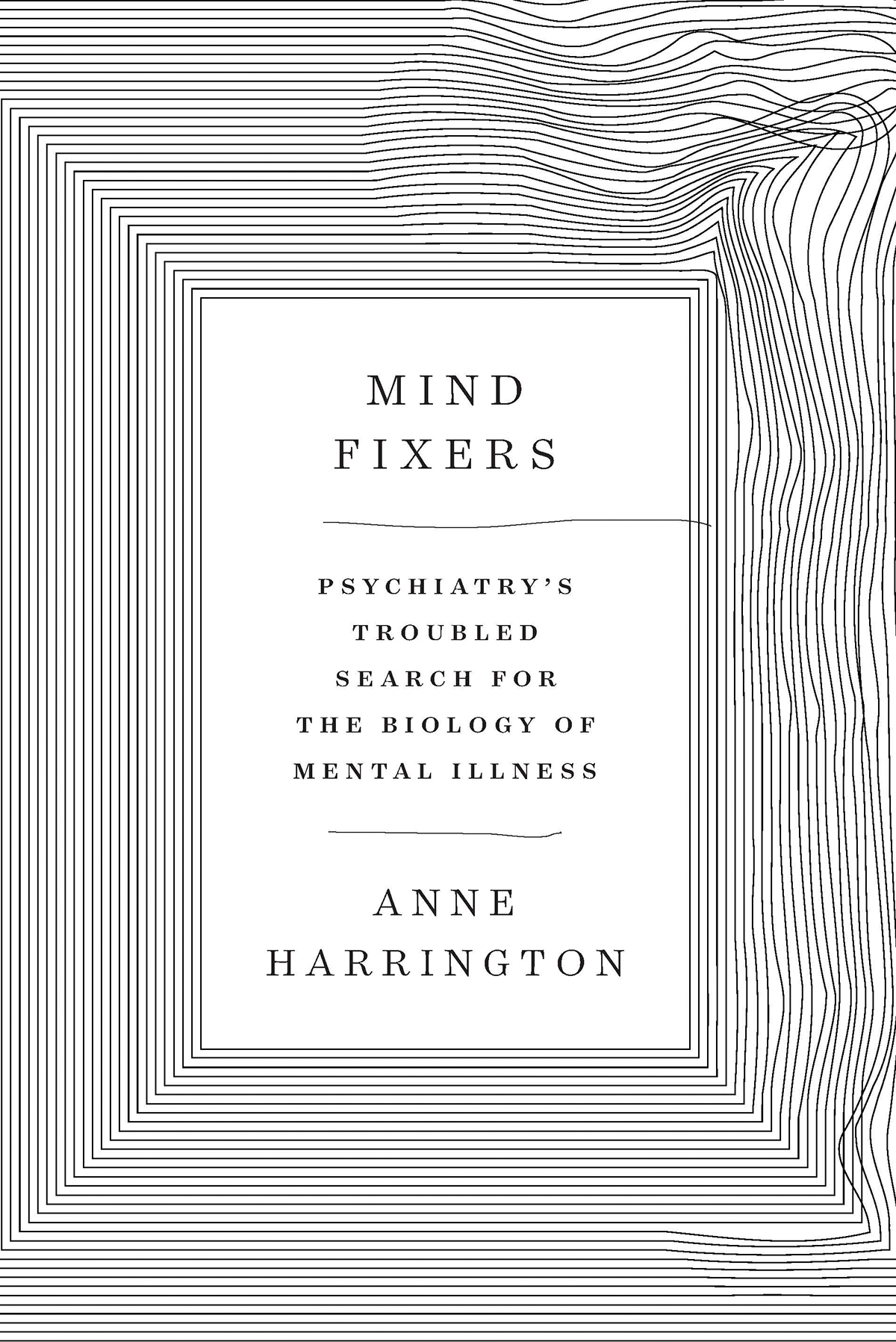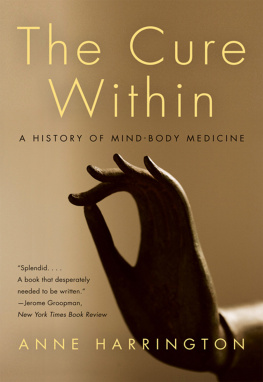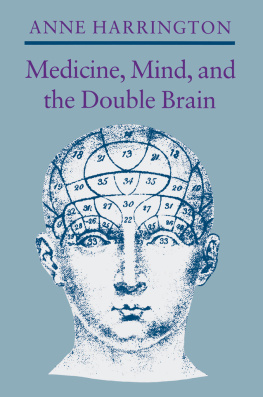Anne Harrington - Mind Fixers
Here you can read online Anne Harrington - Mind Fixers full text of the book (entire story) in english for free. Download pdf and epub, get meaning, cover and reviews about this ebook. year: 2019, publisher: W. W. Norton & Company, genre: History. Description of the work, (preface) as well as reviews are available. Best literature library LitArk.com created for fans of good reading and offers a wide selection of genres:
Romance novel
Science fiction
Adventure
Detective
Science
History
Home and family
Prose
Art
Politics
Computer
Non-fiction
Religion
Business
Children
Humor
Choose a favorite category and find really read worthwhile books. Enjoy immersion in the world of imagination, feel the emotions of the characters or learn something new for yourself, make an fascinating discovery.

- Book:Mind Fixers
- Author:
- Publisher:W. W. Norton & Company
- Genre:
- Year:2019
- Rating:4 / 5
- Favourites:Add to favourites
- Your mark:
- 80
- 1
- 2
- 3
- 4
- 5
Mind Fixers: summary, description and annotation
We offer to read an annotation, description, summary or preface (depends on what the author of the book "Mind Fixers" wrote himself). If you haven't found the necessary information about the book — write in the comments, we will try to find it.
Mind Fixers — read online for free the complete book (whole text) full work
Below is the text of the book, divided by pages. System saving the place of the last page read, allows you to conveniently read the book "Mind Fixers" online for free, without having to search again every time where you left off. Put a bookmark, and you can go to the page where you finished reading at any time.
Font size:
Interval:
Bookmark:

Also by Anne Harrington
The Cure Within: A History of Mind-Body Medicine
Reenchanted Science: Holism in German Culture from Wilhelm II to Hitler
Medicine, Mind, and the Double Brain
The Placebo Effect: An Interdisciplinary Exploration (editor)
for the Biology of Mental Illness
Anne Harrington

Copyright 2019 by Anne Harrington
All rights reserved
First Edition
For information about permission to reproduce selections from this book, write to
Permissions, W. W. Norton & Company, Inc., 500 Fifth Avenue, New York, NY 10110
For information about special discounts for bulk purchases, please contact
W. W. Norton Special Sales at specialsales@wwnorton.com or 800-233-4830
Book design by Daniel Lagin
Production manager: Lauren Abbate
ISBN 978-0-393-07122-1
ISBN 978-1-324-00197-3 (ebook)
W. W. Norton & Company, Inc., 500 Fifth Avenue, New York, N.Y. 10110
www.wwnorton.com
W. W. Norton & Company Ltd., 15 Carlisle Street, London W1D 3BS
Dedication
To my students, whose questions first inspired me to write this book. To my husband, John, my toughest critic and most loyal advocate. To my son, Jamie, because he makes me remember how much of the best parts of life happen outside a library and office.
The ideas for this book were first incubated in a large general education undergraduate lecture class I have taught for some years at Harvard University. I am indebted in ways I can never fully document to the hundreds of students who accompanied me on the evolving journey of that course and my own thinking. They shared insights, questions, and stories of their own, made me question my own assumptions, and in some cases were a first audience for some of the arguments laid out in this book.
For early research assistance (when I imagined completing a rather different final project), I am indebted to former students Kevin Stoller, Brittany Benjamin, and Lauren Libby. For archival materials, I thank the staff of the Oskar Diethelm Library at the DeWitt Wallace Institute for the History of Psychiatry at Weill Cornell Medical College in New York City, the Schlesinger Library at Radcliffe Institute for Advanced Study, the Center for the History of Medicine at the Countway Library of Harvard Medical School, and the many dedicated professionals who have in recent years made so much rich archival material available for scholars to access online.
For feedback on the revised project in its early stages, I am grateful to my editor, Amy Cherry, to my agent, Katinka Matson, and to colleagues at the Newhouse Center for the Humanities at Wellesley College, the Max Planck Institute for the History of Science in Berlin, and the Freiburg University Institute for Advanced Studies in Freiburg. For these early sojourns in Germany, I am grateful for funding support from the MPI and the Humboldt Foundation Alumna Return Program.
Tim Hawley provided line edits on the first rough drafts of chapters, tightening the prose and asking pointed questions. I feel very lucky to have had him in my corner. For generous conceptual feedback on the manuscript as a whole, I am particularly grateful to Elizabeth Lunbeck, Steven Hyman, and John Durant.
Dr. Yvan Prkachin provided exemplary assistance managing all the permissions and images associated with this publication. A talented young historian of neuroscience himself, he also was a trusted sounding board in the final months of preparation.
Over the years, the thinking reflected in this book has benefited from encounters, conversations, and more formal interviews with scientists, clinicians, parents, and patients. While it is impossible to adequately thank them all, I would particularly like to acknowledge Steven Hyman, Thomas Insel, Alan Stone, Elyn Saks, Kay Redfield Jamison, Barbara Leadholm, Peggy Senturia (who helped me reach out to other mothers who lived with mental illness in their families through the formative 1970s), and Linda Schneider.
For support and nurturing intellectual community, especially in the final months of work on this book, I am indebted to the Freiburg Institute for Advanced Studies (FRIAS) at the University of Freiburg. I also gratefully acknowledge funding in this period from the People Programme (Marie Curie Actions) of the European Unions Seventh Framework Programme (FP7/20072013) under REA grant agreement n [609305].
IN 1978 THE HISTORIAN AND SOCIAL CRITIC MARTIN GROSS APPEARED on the television show Firing Line to talk about his scathing new book, The Psychological Society . Scorning the current infatuation of psychiatry with psychoanalytic practices, he prophesied that within the next ten years... psychiatry will come out of the dark ages, will drop all the nonsense and expertise about human behavior of which they know absolutely nothing that my grandmother didnt know, if they know that much, and will turn to medicine. His interlocutors were more than a little skeptical and even amused by his passion. One of them, the newspaper publisher and editor Sylvan Meyer, asked ironically how Gross thought that a major body of science thats been in business for a fairly long time could be disposed of so quickly.
It was Gross, though, who had the last laugh, and he did not have to wait ten years, or even five, to have it. Just two years after he sounded off on Firing Line , the Los Angeles Times reported on a meeting of the American Psychiatric Association and the major changes in process:
Ten years ago, the typical psychiatrist was still something of a Freudian facsimile, an aloof figure guiding his troubled patientson the couchthrough the mazes of their unconscious....
No more.... The typical shrink of the 80s is more likely to view craziness as a combination of genetic, developmental and environmental stress factors coming together. And the excitement in the field centers on advances in brain biochemistry and neuroanatomy; convention seminars on such subjects as the psycho-pharmacology of depression now draw standing-room only crowds.
A year later, in 1981, two prominent psychiatrists predicted in Psychology Today the coming of a post-Freudian world, one where patients with emotional problems were treated, not with mere talk, but in a proper medical fashionwith drugs [that]... normalize a deep abnormality close to underlying causes.
By 1984, the Pulitzer Prizewinning science journalist Jon Franklin felt able to drop all pretense of deference toward the alleged opposition and to mock psychoanalysis as the bumbling and sometimes humorous stepchild of modern science. The future of psychiatry, he said, lay not with the old talk therapists and analysts but with a new generation of clinician-scientists he called the mind-fixers: research psychiatrists... working quietly in laboratories, dissecting the brains of mice and men and teasing out the chemical formulas that unlock the secrets of the mind.
That same year the psychiatrist Nancy Andreasen released a book whose title seemed to say it all: The Broken Brain: The Biological Revolution in Psychiatry. In it, she told her readers that psychiatry is in the process of undergoing a revolutionary change, and realigning itself with the mainstream biological traditions of medicine. Everyone should celebrate this fact, she said, not least because once the public at large realized that mental illnesses were diseases like any other, the mentally illlong stigmatized and misunderstoodcould finally be understood simply as human beings who deserve as much sensitivity and love as people who suffer from cancer, muscular dystrophy, or heart disease. No one should mourn the passing of the psychoanalytic era, she said, because the new biological perspectives were opening the door not only to more effective treatments but to a more humane and compassionate approach to mental illness.
Font size:
Interval:
Bookmark:
Similar books «Mind Fixers»
Look at similar books to Mind Fixers. We have selected literature similar in name and meaning in the hope of providing readers with more options to find new, interesting, not yet read works.
Discussion, reviews of the book Mind Fixers and just readers' own opinions. Leave your comments, write what you think about the work, its meaning or the main characters. Specify what exactly you liked and what you didn't like, and why you think so.










